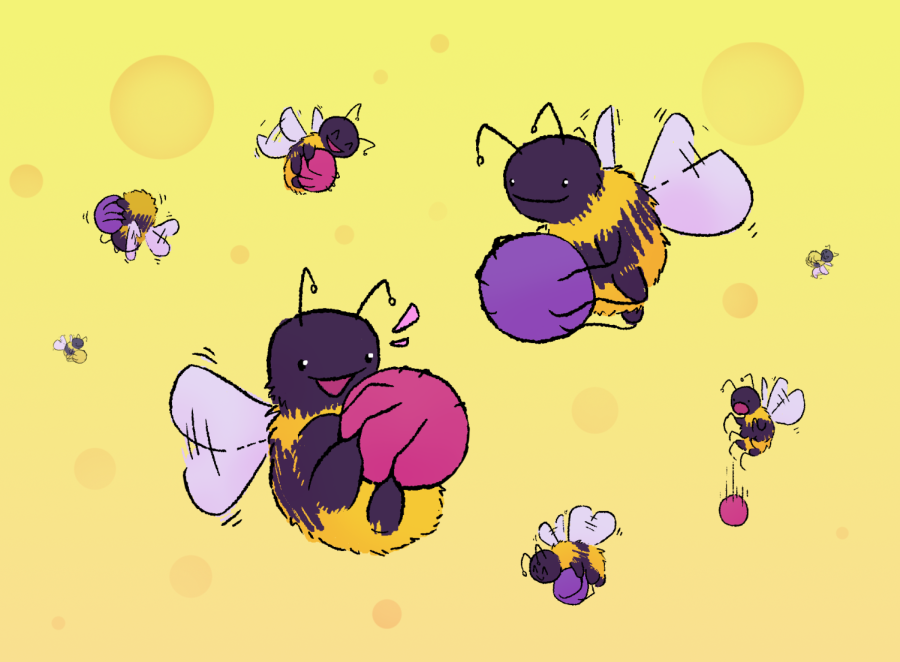Exploring entomology is crucial to understand insects’ emotions
Bees enjoy rolling around and playing with small toy wooden balls. (Cartoon by Amber Siegel)
March 22, 2023
Last fall, scientists at the Queen Mary University of London published a scientific report on bumblebee playing. Research that glances into the lives and minds of insects deserves more public interest.
According to the study, bumblebees were placed in a no-stress environment with a path leading toward food. Rather than going for the food, however, scientists observed the bumblebees choose to roll about on the wooden balls that were accessible through a separate path.
The bees were provided with no incentive to touch the wooden toy balls, and scientists can’t determine any reason for this behavior beyond the bumblebees’ own pursuit of happiness. This seems to be evidence that bumblebees can be playful, suggesting a level of emotional intelligence previously thought to be nonexistent among insects.
The research and its findings serve as an excellent example of present-day entomology, the study of insects.
While few would deny that fuzzy, pollen-coated bumblebees are cute, entomology is not limited to the pretty or adorable. Getting the public excited about biting flies, disease-carrying beetles or other six-legged creepy crawlies can be a tricky task.
Nature, however, has never measured ecological importance by what humans find attractive.
In an effort to learn more about entomology and why it should be better supported, I spoke with Ellie Taylor, a graduate student in the biological sciences department at NIU. Currently working with house flies and wasps, Taylor has no qualms with insects, even those most of us would consider pests.
In fact, halfway through our interview, Taylor stood up, casually pulled a tub of frozen American cockroaches out of the fridge behind her and held one gently in her palm for me to see.
“A lot of people are afraid of insects because…their main experiences with insects are from a pest outlook,” Taylor explained. “But there are so many different aspects to entomology that we depend on for our everyday life…that we wouldn’t be able to have if we didn’t have insects…the vast majority of plants that require pollination require a pollinator, and a large proportion of those are insects.”
Whether they are pollinating, preying on other insects or decomposing nutrients back into the soil, insects are the secret superheroes of our planet, the true bee’s knees. Quietly, however, they are fading. According to a 2019 report, 41% of insect species are threatened with extinction, and 2.5% of the biomass our planet loses each year is due to the loss of insect species.
It’s this increasing loss which makes studies such as the bumblebee study so necessary.
Emotion is a tricky thing in science. As Taylor explains it, we cannot simply ask bees how they are feeling or why they have chosen to roll clumsily about with wooden balls rather than pursue a waiting food source.
“We have the strict definitions that we follow, and then they set up experiments to see whether or not what’s occurring fits into those definitions,” Taylor said. “The other thing that we can do is look at what chemicals their bodies are producing to see if those chemicals are associated with different traits.”
Ultimately, scientists may suggest that insects feel, but cannot confirm.
As a columnist, however, with no such obligations to scientific etiquette, the study of insect “emotions” delights me.
For centuries, humanity denied emotion in animals, but today most pet owners would never doubt the feeling of their animal companions. Perhaps the misunderstood insect is simply the next section of life we must extend our graces and open our hearts to.
At the very least, it is surely more detrimental to assume a lack of emotion in something that lives than it is to assume some degree of feeling exists within it. Take away a creature’s feeling, and you justify all measures of cruelty against it.
“We are producing ever-increasing amounts of evidence backing up the need to do all we can to protect insects that are a million miles from the mindless, unfeeling creatures they are traditionally believed to be,” Professor Lars Chittka, head of the Queen Mary University’s bumblebee lab, said.
So yes, students like Ellie Taylor delight me. Entomology with its quirky, buzzing, and biting subjects delights me.
Whether or not we ever fully understand the emotional capacity of these peculiar animals, we are dependent on them. They are dependent on whatever action we choose to take next. Perhaps, then, it’s time to step into the tiny shoes of our planet’s littlest creatures.



